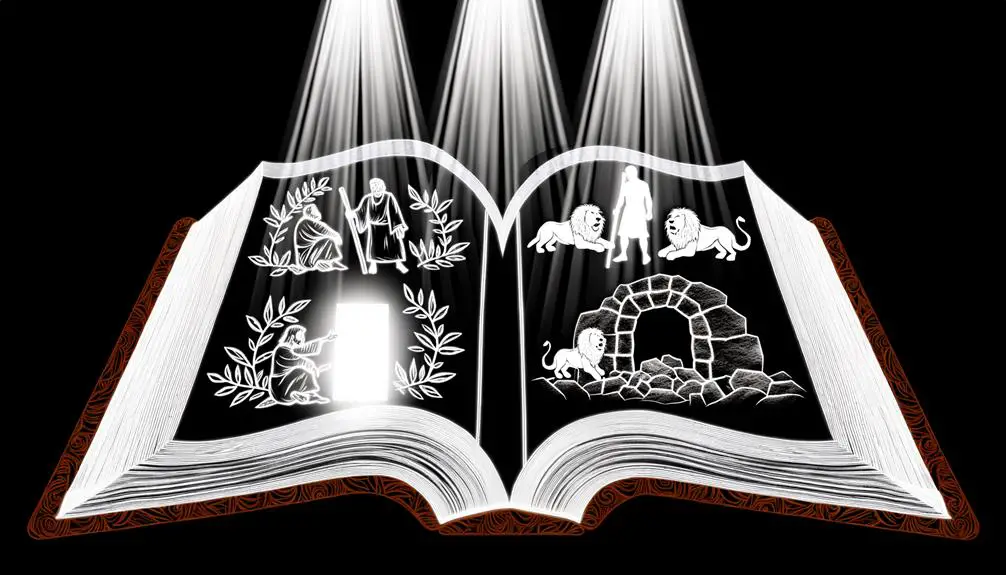This exploration of vindication in the Bible reveals divine justice and its profound impact on faith and righteousness, inviting deeper reflection.

What Does Vindicate Mean in the Bible
When you explore the concept of vindication in the Bible, you're essentially unearthing how divine justice is served in a world that often seems tilted against the faithful. This term, deeply woven into the fabric of scripture, carries a weight of proving one's innocence or righteousness, often through God's direct intervention.
As you consider the historical and prophetic layers that define vindication, keep in mind how its application could shift your understanding of trials and divine retribution. The journey through biblical vindication promises not just insights into ancient justice but also a fresh perspective on how these principles resonate in today's challenges.
Key Takeaways
- Vindication in the Bible signifies divine affirmation of righteousness, transcending human judgment.
- It involves God's intervention to validate moral integrity and faith against opposition.
- Faith plays a central role in achieving vindication, emphasizing trust, perseverance, and moral steadfastness.
- Biblical vindication culminates in divine justice, offering restoration, redemption, and moral triumph for believers.
Defining Biblical Vindication

In a biblical context, vindication involves the divine affirmation of a person's righteousness, often in the face of opposition or accusation. This concept is central to understanding the dynamics of justice and morality within the scriptures. Vindication explained in this light isn't merely about proving one's innocence or worth but is deeply intertwined with the idea of divine intervention and recognition. It's a declaration that transcends human judgment, asserting a higher form of validation that comes directly from God.
Drawing modern parallels to this ancient concept might seem challenging at first glance. However, the essence of vindication, as understood biblically, finds its reflection in contemporary instances where individuals seek validation not from the societal or legal system but through a sense of moral or spiritual righteousness. In today's context, vindication could manifest in various forms, such as public acknowledgment of an individual's unjust treatment being corrected or a person's beliefs and actions being recognized as just, despite widespread criticism or disbelief.
This understanding of vindication goes beyond the simplistic notion of being proven right; it encompasses a deeper longing for divine or moral acknowledgment in a world often fraught with injustice and misunderstanding. The biblical narrative provides numerous instances where vindication serves as a pivotal theme, offering insights into the human condition and the quest for divine justice. Thus, drawing parallels to modern experiences allows for a richer appreciation of vindication's enduring relevance, highlighting its profound impact on both individual lives and collective societal norms.
Historical Context of Vindication

Understanding the historical context of vindication requires delving into ancient legal and moral systems where divine judgment played a central role in affirming righteousness. The legal origins of vindication in these contexts stem from a deeply interwoven fabric of law, religion, and community life, where the legal systems weren't only about maintaining order but also about upholding moral and ethical standards as defined by their beliefs and traditions.
In ancient societies, laws weren't just rules set by the powerful; they were often seen as divinely inspired or directly given by a deity. This intertwining of the divine with the legal system meant that vindication—being cleared of blame or justified—carried with it a profound sense of divine approval or disapproval. Thus, to be vindicated wasn't only to be found innocent in a human court but also to be seen as righteous in the eyes of the divine.
Cultural interpretations of vindication varied significantly across different societies and time periods. In some cultures, vindication was closely linked to honor and social standing, where being vindicated restored not just legal status but also social and familial honor. In others, it was more about personal integrity and the relationship between the individual and the divine, with less emphasis on societal perceptions.
This complex interplay between legal origins and cultural interpretations of vindication underscores its significance in ancient societies. It wasn't merely a legal concept; it was a multifaceted principle that touched on law, morality, society, and the divine, making it a pivotal concept in understanding ancient legal and moral systems.
Vindication Through Divine Justice

Vindication through divine justice reveals how ancient societies perceived divine intervention as essential in affirming one's righteousness or guilt. This notion, deeply embedded in biblical narratives, illustrates a worldview where the divine realm actively participates in human affairs, particularly in matters of justice and morality. You'll find that, in these contexts, divine vindication serves as the ultimate affirmation of innocence or condemnation, transcending human judgments which might be flawed or biased.
Modern interpretations of these biblical concepts often challenge us to rethink the relationship between divine justice and human morality. They encourage a deeper exploration of the ethical implications inherent in seeking divine vindication. For instance, the reliance on a higher power for moral vindication raises questions about personal accountability and the human capacity for moral discernment. It prompts you to consider how these ancient texts influence contemporary understandings of justice, righteousness, and the role of divine intervention in our moral and ethical decision-making processes.
Moreover, the concept of divine vindication in the Bible underscores a fundamental belief in a moral order that surpasses human understanding and control. This belief carries significant ethical implications, especially in how it shapes individuals' actions and attitudes towards justice and morality. It suggests a worldview where ultimate justice isn't immediate but assured by a higher moral authority, encouraging patience, faith, and a deep-seated trust in the moral structure of the universe as perceived through the lens of faith.
Thus, understanding vindication through divine justice in biblical terms not only offers insights into ancient moral frameworks but also challenges modern readers to reflect on the ethical dimensions of their own beliefs and actions in light of these enduring spiritual narratives.
Examples of Vindication in Scripture

In exploring instances of vindication within the Bible, you'll encounter narratives that exemplify how righteousness is affirmed by divine intervention. Job's unwavering faith under duress and David's absolution from his enemies serve as pivotal examples.
These stories not only highlight the moral and theological dimensions of vindication but also underscore its significance in the broader biblical narrative.
Job's Righteous Stand
Amid the myriad examples of vindication in Scripture, Job's righteous stand emerges as a profound testament to unwavering faith and integrity in the face of undeserved suffering. Job's story illuminates several core themes:
- Suffering's purpose as a test of faith and character
- The reward of patience in enduring trials without losing faith
- The importance of maintaining integrity under duress
- The eventual vindication and restoration by God as a testament to Job's righteousness
This narrative teaches you that enduring faith amidst adversity isn't overlooked by God. It underscores the belief that while suffering may seem inexplicable and unjust, it holds the potential for spiritual growth and ultimate vindication, emphasizing the profound reward patience and steadfastness can yield.
David's Divine Clearance
Several biblical narratives showcase the theme of divine justice. David's story stands out as a compelling example of how steadfast faith and righteousness lead to God's vindication in times of unjust accusation and persecution.
David's divine clearance is vividly illustrated through his confrontation with Goliath. His faith and reliance on God's power result in the giant's defeat, symbolizing the triumph of divine justice over seemingly insurmountable odds.
Furthermore, Saul's jealousy and subsequent attempts to kill David highlight the adversity faced by those walking in righteousness. Despite these challenges, David's unwavering faith and moral integrity ultimately lead to his vindication.
God protects and elevates him, affirming his righteousness in the face of false accusations and malevolence.
The Role of Faith in Vindication

Faith plays a pivotal role in the concept of vindication throughout the biblical narrative, serving as both a foundation and catalyst for divine justice and restoration. The scriptures unfold numerous accounts where faith's resilience and spiritual perseverance underpin the journey towards vindication. This faith isn't passive; it's a dynamic force that believers wield, demonstrating unwavering trust in God's promises, even amidst adversity.
Within the biblical context, consider the following aspects of faith in relation to vindication:
- Active Trust: Faith involves an active trust in God's plan and timing, not merely a hopeful desire for vindication. It's a commitment to believe in divine justice, even when current circumstances seem unjust.
- Spiritual Perseverance: The endurance to maintain faith during trials is crucial. Spiritual perseverance ensures that believers remain steadfast in their faith, trusting in God's ultimate plan for vindication.
- Moral Integrity: Faith calls for holding onto one's moral and ethical beliefs, even when such positions might lead to temporary suffering or disadvantage. This integrity is often a prerequisite for divine vindication.
- Hope for Restoration: Faith fosters a hopeful outlook towards future restoration and justice. Believers are encouraged to look beyond their present troubles, anticipating God's faithful resolution.
Analyzing these components reveals that faith isn't merely a static belief but an active engagement with divine promises. It requires resilience, a commitment to spiritual perseverance, moral integrity, and a hopeful anticipation of God's justice. Thus, in the biblical narrative, faith functions as both the bedrock and the mechanism through which vindication is realized, demonstrating a profound interplay between human belief and divine action.
God's Promise of Vindication

Understanding God's promise of vindication is pivotal to grasping the overarching narrative of justice and redemption woven throughout the Bible. This concept isn't merely about proving one's rightness or innocence; it's deeply tied to moral restoration and personal triumph over adversity. The biblical narrative frequently showcases God's commitment to vindicating His people, underscoring a profound assurance that wrongs will be righted and truth will ultimately prevail.
In the context of moral restoration, vindication involves a process whereby God not only clears His people of blame but also restores their moral and spiritual standing. This aspect of vindication highlights a transformative journey from a state of perceived guilt or unworthiness to one of righteousness, facilitated by divine intervention. It's a testament to God's unwavering faithfulness and His power to redeem and restore.
Personal triumph, as another facet of vindication, emphasizes the individual's victory over their oppressors or circumstances through God's intervention. Unlike human efforts to achieve justice or clear one's name, this triumph is divinely orchestrated, showcasing God's ability to elevate the downtrodden and bring about justice. It's a powerful reminder that while individuals may face injustice or suffering, God's ultimate plan includes their vindication and the restoration of their honor and dignity.
In essence, God's promise of vindication in the Bible offers a dual assurance: moral restoration and personal triumph. This promise serves as a beacon of hope, assuring believers that despite the injustices and trials they may face, God's justice will prevail, leading to their ultimate vindication and redemption.
Vindication in Prophecy and Revelation

Exploring the concept of vindication within biblical prophecy and revelation reveals a profound dimension of divine justice and the fulfillment of God's promises to His people. This aspect, deeply interwoven into the fabric of scripture, offers an insightful lens through which to comprehend the overarching narrative of redemption and divine justice.
In the realm of prophecy and revelation, vindication serves as both a promise and a process. It's not merely about proving the righteous right or the wicked wrong; it's about the eschatological validation of God's sovereignty and the eventual restoration of all things under His rule. This theme is evident in various prophetic writings and the book of Revelation, where the culmination of God's plan for humanity and the universe unfolds.
To further grasp this concept, consider the following points:
- Eschatological validation emphasizes the ultimate vindication of God's people and the establishment of His kingdom.
- Prophetic fulfillment serves as tangible evidence of divine faithfulness, reinforcing the trustworthiness of God's word.
- The assurance of divine justice comforts those enduring suffering or persecution, promising that all wrongs will be righted.
- Restoration and renewal themes encapsulate the idea that vindication leads to the re-establishment of creation's intended glory and harmony.
In analyzing these elements, it's clear that vindication within the context of prophecy and revelation isn't solely about retribution or proving detractors wrong. It's deeply tied to the hope of eschatological validation and the prophetic fulfillment of God's unchanging promises, showcasing His ultimate victory and the restoration of all things.
Frequently Asked Questions
How Do Different Denominations Interpret the Concept of Vindication in the Bible, and Are There Any Significant Theological Disagreements?
You'll find that interpretations of vindication across denominations hinge on views of divine judgment and ecclesiastical authority.
While some see it as a clear demonstration of God's justice, others interpret it through a lens of mercy and redemption.
Theological disagreements often stem from these foundational beliefs. It's a complex topic, where each denomination's doctrine influences its understanding, reflecting broader theological divides on justice, mercy, and the nature of divine authority.
In Modern Times, How Can Christians Apply the Biblical Concept of Vindication to Social Justice Issues and Advocacy?
In addressing social justice and advocacy, you can apply the biblical concept of vindication by emphasizing forgiveness and compassion outreach. This approach requires understanding vindication not just as personal exoneration, but as a call to fight for justice and mercy within the community.
It's about actively working to right wrongs while fostering an environment of forgiveness and compassion, thereby embodying the principles of vindication in a contemporary, impactful way.
Are There Any Biblical Figures Who Were Not Vindicated Within Their Lifetimes, and What Lessons Can We Learn From Their Stories?
As the saying goes, 'Time reveals all truths,' many biblical figures weren't vindicated within their lifetimes, teaching us valuable lessons on personal forgiveness and prophetic fulfillment.
Analyzing their stories, you'll find that enduring injustices with grace and maintaining faith in divine justice offers profound insights.
These narratives encourage you to see beyond immediate validation, emphasizing the importance of long-term perspective and the eventual realization of truth and righteousness.
How Does the Concept of Vindication in the Bible Compare to the Understanding of Justice and Retribution in Other Major World Religions?
You're exploring how divine justice and retribution ethics in the Bible compare to other major world religions.
It's fascinating to see the variance in interpretations. While the Bible often intertwines vindication with divine justice, other traditions may emphasize karma or a balance of moral actions.
This analysis reveals a rich tapestry of beliefs about justice and retribution, highlighting both unique perspectives and shared human values across different faiths.
Can the Desire for Vindication Become Spiritually Unhealthy or Lead to Misinterpretation of Biblical Teachings, and How Can Believers Guard Against This?
Yes, seeking vindication can lead to spiritual unhealthiness, especially when it overshadows personal forgiveness and emotional healing. To guard against this, you should focus on understanding and embracing forgiveness, both of others and yourself.
This approach encourages emotional healing and prevents the misinterpretation of biblical teachings. By prioritizing forgiveness and healing, you align more closely with spiritual teachings and avoid the pitfalls of seeking vindication at the expense of personal and spiritual growth.
Conclusion
In essence, you've journeyed through the profound landscape of biblical vindication, where divine justice often presents itself cloaked in irony. The oppressors become the oppressed, the last become first, and the meek inherit the earth.
Through this divine irony, you witness the overturning of human expectations, revealing a deeper, divine logic at play. It's in this upside-down kingdom that faith's role and God's promise of vindication shine brightest, challenging us to see beyond the surface to the ultimate justice that awaits.



Sign up